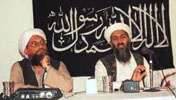
Ayman al- Zawahiri and Osama Bin Laden
A collection of secret email exchanges between Ayman al- Zawahiri, leader of the Egyptian Jihad Organization and a top ally of Al- Qaeda Organization leader Osama Bin Laden, and his men in the Middle East, and Europe reveals the ideological changes in Al- Zawahiri”s thinking. These ultimately led to his signing of the statement issued by the World Front for Fighting the Jews and Crusaders (WFFJC) with Bin Laden in February 1998.
Asharq al- Awsat has obtained secret documents from Ayman Al-Zawahiri”s personal computer that was found in a house in Kabul after the US raids on Afghanistan in October 2001 . Most of the correspondence was conducted before or after the bombing of the US Embassies (in Kenya and Tanzania ) on 7 August 1998 in which 200 persons were killed and 4,000 were injured.
The secret correspondence between Al- Zawahiri, who was moving between Kabul and Kandahar , and his men abroad contains clear and open pointers to the "WFFJC" and the "Liberation of Islamic Holy Places Army" as well as "coded" ones about "Al- Qaeda." The "contracting company" was the cover given to "Al- Qaeda" and the "contractor" to Osama Bin Laden. The latter did not honor many of the promises he had made to the leaders of the Egyptian "Jihad", causing many administrative problems in the "company" or the "emirate", the alias for Al- Zawahiri”s organization in Afghanistan . The deciphering of the coded references in Al- Zawahiri”s secret papers required several visits to the homes of some fundamentalists in London . Many of the nicknames of "Jihad" leaders close to Bin Laden who were mentioned in these secret papers were discovered. One of the letters shows the resentment of some Jihad leaders living in Yemen. Dated 17 February 2001, six months before the September 11th bombings, the four leaders say in their letter to Al- Zawahiri: We will stay if we see that the situation has improved and believe that the group might need us. We will be, God willing, fully prepared to return to action. They also underline their desire not to publicize the "Jihad" group”s problems abroad and in the last paragraph in their electronic message, they say: If we stay in this country or go abroad, we will continue to coordinate and act with the group so as to protect its public image.
But they also asked to maintain a cordial or one thin thread with the "Jihad" leaders. They focus on the importance of not hanging the "dirty clothes" on the roof, or in other words, not bringing the problems to the surface by not criticizing Al- Zawahiri and the group that was with him in Kabul and Kandahar.
The four leaders stress in the message written by Abu- Abdallah that the temporary secession from the group was not a conspiracy but one of fate. In other words, the ideas and feelings converged in that direction. An Egyptian Islamist revealed the identity of Fathi, who signed the secession letter, as an Egyptian computer expert who specialized in writing the shari”ah statements and jihad booklets published by the group. They (signatories) say: "On our part, our personal relations will not be affected, God willing, by this decision. We will be as keen as possible not to make our problems public and will coordinate and act together in order to maintain the group”s image." The fundamentalist leaders admit there were sharp internal conflicts at the top echelon of "Jihad" and that there were differences in thinking between the old and the new administration. These differences reached in some cases the point of radical disputes and contradictions. They say they decided to resign because of The "Jihad" group found itself in a leadership crisis after the signing of the WFFJC, when it was reported that its leader Al- Zawahiri had resigned from his post because of differences over "Jihad”s" public strategy of "fighting the enemy who is close at hand is better and more deserving than the enemy who is far away.".
According to fundamentalists” sources in London, some of Al- Zawahiri”s letters contained sharp personal differences and accusations over the emirate, which even reached the level of using terms such as "betrayal" and two decisions dismissing two "Jihad" leaders in London.
One of them concerns "Abu- Nidal" or " Abbas", the nicknames of Adil Abd-al-Majid Abd-al-Bari who is held in London pending a ruling on a US application for his extradition on the charge of involvement in the bombing of the US Embassies in Nairobi and Dar es Salaam.
There are many riddles and nicknames in Al- Zawahiri”s secret documents as well as clear references to the "contractor", Osama Bin Laden”s nickname. "Company" refers to "Jihad" and the "contracting company" to "Al-
Qaeda" Organization.
In one of the letters signed by Al- Zawahiri and dated 4 October 1998, the Jihad leader comments on the initiative to "stop violence in Egypt " and says the " jihadist movement has appeared to be weak because the political translation of this initiative is surrender. He also says that in any battle where the fighter is compelled to stop the engagement and incitement, he therefore agrees to be captured and hands over his men and weapons in return for nothing. There is also a strong attack on Muntasir al-
Zayyat, the fundamentalists” lawyer in Egypt who announced and adopted the initiative to stop violence in 1997. The "Islamic Group”s" (IG) leaders called for the cessation of fire that year but most of their colleagues did not support it.
It becomes clear from the comments of the Egyptian "Jihad" organization”s leader that he was following international events and statements on the jihad movement through satellite channels and newspapers when he was in Afghanistan before 11 September.
